Anyone who has ever run a campaign knows what the term “high propensity voters” means. Each party has their lists of registered voters and their reliability of showing up on election day. High propensity voters are the ones who can be relied on to show up for every election, whether it’s a primary, midterm, local election, or (of course) presidential election. I think that you can probably figure out what mid and low propensity voters are.
The common wisdom from establishment campaign officials is that they key to winning an election is to focus on getting those high propensity voters out, and turning out enough mid propensity voters to make the difference. The high propensity voters get all the love (by love, I mean annoying phone calls and door knocks to keep them fired up). If you Google the term “high propensity voter”, you will see that this is still the commonly held belief. But I think this belief has been nonsense since 2008. It might have been true before then, but it hasn’t been true since.
Barack Obama built a new kind of coalition in 2008. He brought in a shitload of first time voters. He in fact brought in so many first time voters, that he was able to lose one out four Hillary primary supporters and still beat John McCain by fourteen million votes. That was a whopping seven point victory, which is yuuuuuuggggge in a presidential election. He won freaking Indiana, which went blue for the first (and last) time since 1968. That’s how fucking strong his new coalition was.
Trump did the same thing in 2016. He stitched together a new coalition of independent and first time alt white voters (who never vote) and won Pennsylvania for the first time since 1989. He flipped blue collar voters in that state. Take a look at the differences between the 2008 and 2016 electoral maps:
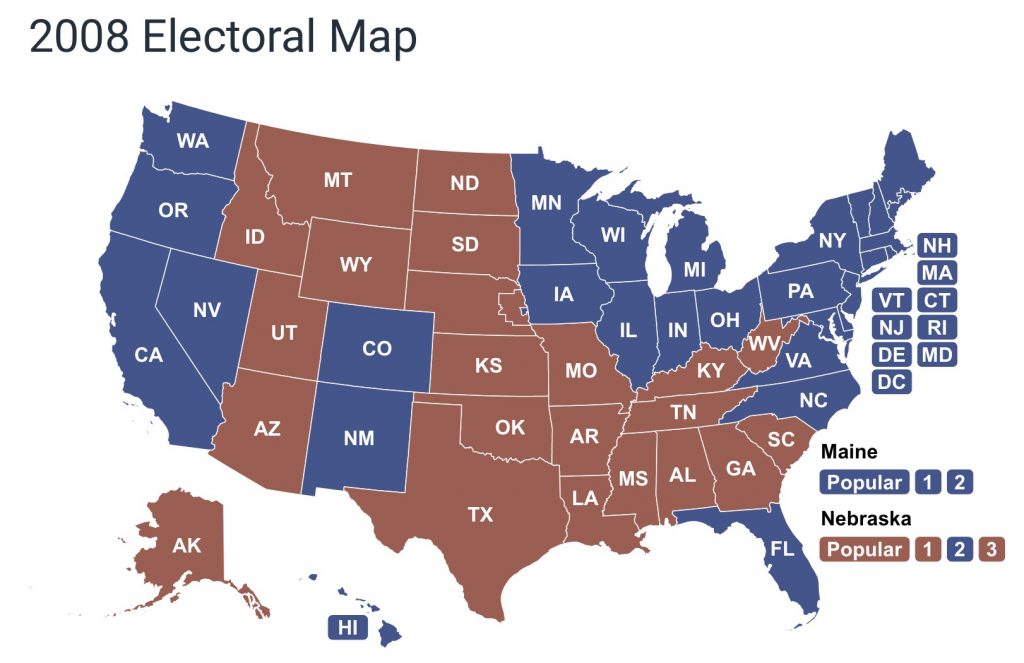
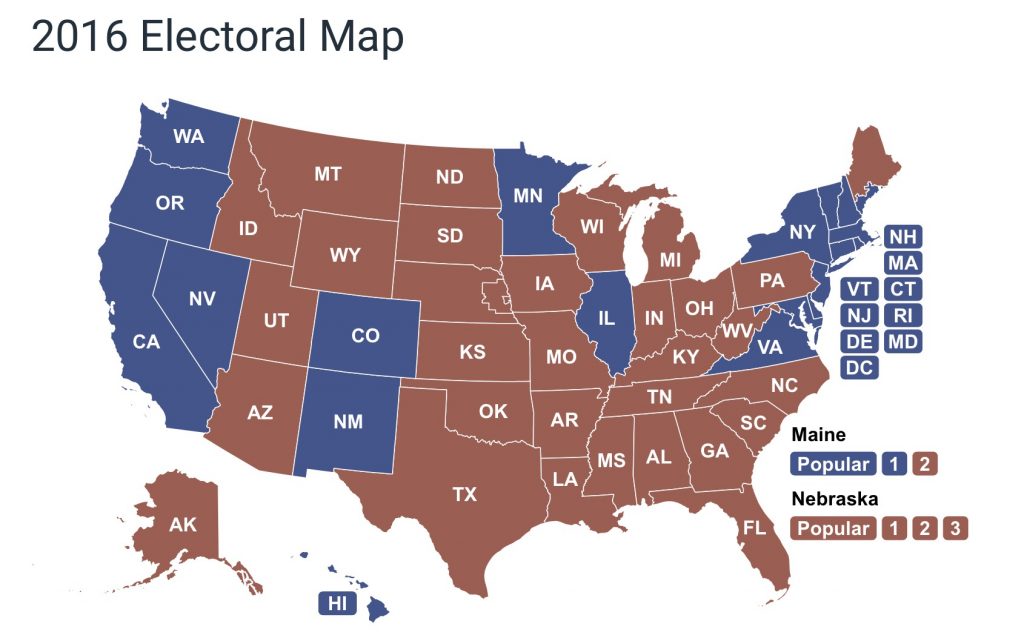
These are some pretty massive swings, and they were accomplished by yes – getting the high propensity voters out, but more importantly – bringing new voters into the fold.
In the past 3 presidential elections, you could see giant waves of new voters coming a mile away, just by paying attention to each candidates’ rallies. The excitement wasn’t something that you had to predict. It was right there in front of you, in the form of rallies that attracted tens of thousands of people.
In addition to the giant rallies, there was another important factor that came into the 2018 midterm elections. Age. it was the 18 – 44 demographic that saved us in 2018. Republicans had a pretty big surge in turnout over 2014, but not as big as democrats.
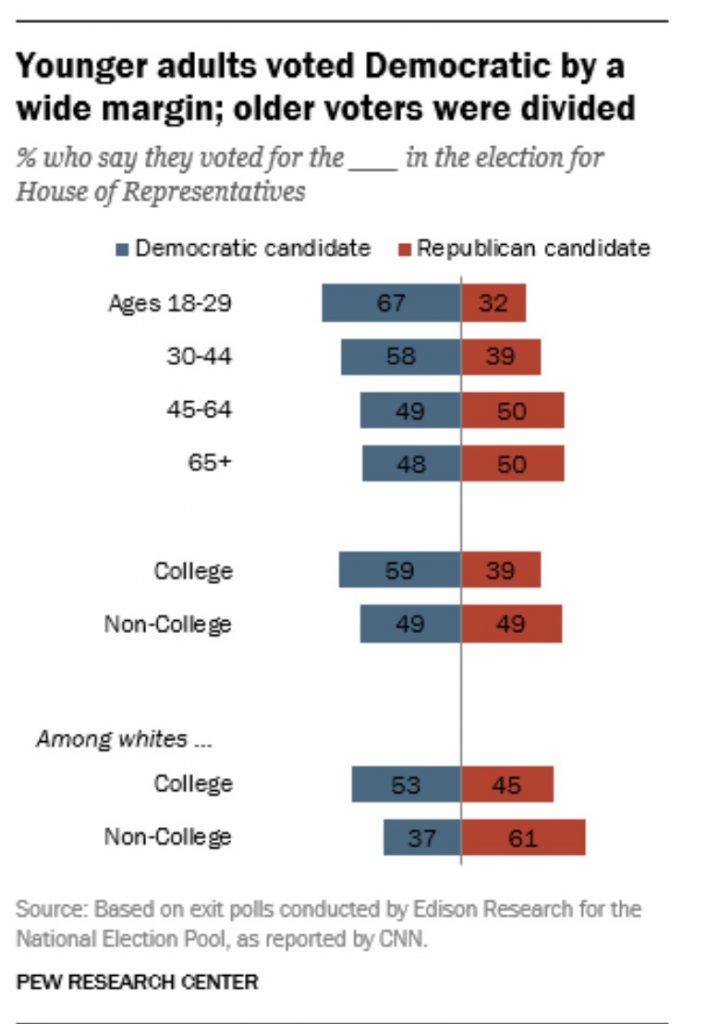
The college vote doubled in 2018. In fact, Gen X, Millennials, and Gen Z outvoted Boomers in 2018.
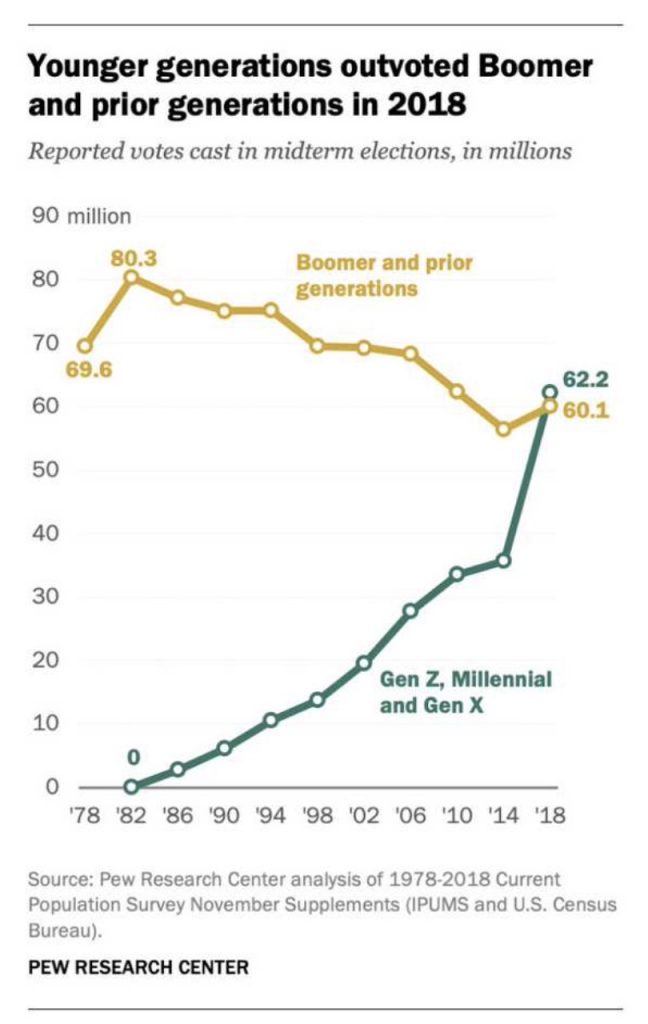
There’s absolutely no reason to believe that they’re not going to be the majority of the electorate in a presidential election. So even in the last midterm, high propensity voters aren’t where the game changers. Not even close. Thirty percent of eligible Gen Z voters showed up in 2018. That doesn’t sound like a lot, but it blew away Gen X and Millennials who came in at around 22% when it was their turn to vote in midterms as youngsters.
And guess what? Both Millennials (who are now in their 40s, btw) and Gen Z are really fucking liberal. I have my theories as to why.
So where am I going with all this? People online keep telling me that we have to vote for a candidate who isn’t going to scare moderates. No one that’s made that argument has been able to provide me with a single shred of empirical evidence to support that claim so it’s always, “trust me, I live among them”. Long time followers of mine know how little regard I have for anecdotal evidence.
My position is that it’s insane to advocate for electing a primary candidate that hasn’t managed to muster up any enthusiasm because you think that there are a group of people (who can’t be fucked to show up at a political rally) who are going to be turned off by the person drawing the big crowds. I have never witnessed logic being tortured this badly in my entire life. You’re going to give up birds in the hand for the birds you imagine are in the bush? Based on what? If you’re going to make that claim to me, show me something.
The democratic electorate went with the “safe” choice in 2016. How did that turn out for us? Bernie and Trump’s rallies were held in places where Beyonce and The Rolling Stones performed, and Hillary’s rallies were attended by a few hundred people. That was pretty fucking telling. Excitement happens around a candidate, not a party. In fact, Americans are running away from both parties in droves. Let me assure you that republicans are going to see some huge turnout numbers this year. We need to make damned sure that we have another exciting candidate because voting for ho-hum is a giant fucking gamble that I don’t feel like making right now.
Your own lying eyes have told you where the excitement in this primary lies. Warren and Sanders are the only ones who have packed their rallies with tens of thousands of people. I’m going to confess that they were the only two candidates who were likely to make my short list coming out of the gate, although I did keep an open mind. That said, the fact that no one else is attracting the kinds of numbers that Warren and Sanders are at their rallies should make them all a nonstarter for everyone. If the former vice president to a wildly popular president couldn’t bring in big crows from the moment he announced, he’s extremely likely to beat Trump.
So now let’s look at the demographics supporting the only two viable candidates.
I have numbers for Warren that are from October, when her poll numbers were the highest they had ever been. I don’t believe that she can’t win back anyone she’s lost, so let’s look at those numbers.
Warren has consistently been very strong with white college educated voters. The higher the level of education, the higher her slice of that support goes. In terms of age, she has a consistent 25% – 29% support across all demos. She only has 18% support with people who make less than 50k per year. That goes way up to 35% and 36% with people who make 50k – 100k and 100k+ (respectively). She’s also doing very well with women (much better than Hillary did). She has the second strongest support among older black voters at 53% (remember, older black voters are high propensity voters). She’s trailing behind Sanders with Latinos, but her numbers there are far ahead of Biden’s.
Now let’s move on to Bernie. Let me start by dispelling a myth: Bernie did very well with people of color in 2016. The dividing line was by age, not by race. He tied Hillary with people of color from ages 18 – 44 and he did it with no comb, no tailor, and no millions of dollars in corporate cash. So let’s look at the numbers in this race.
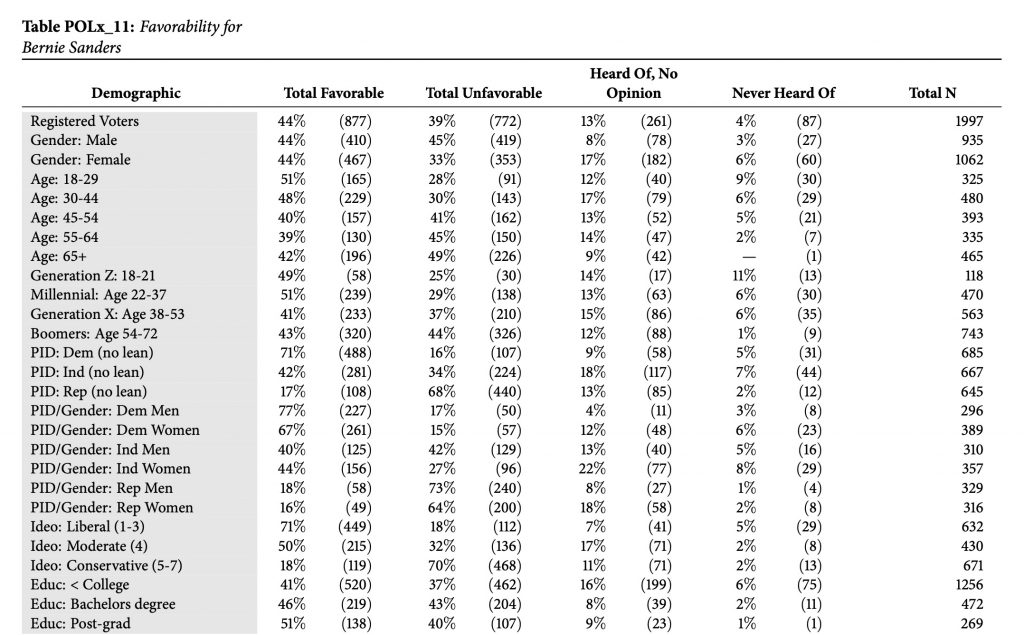
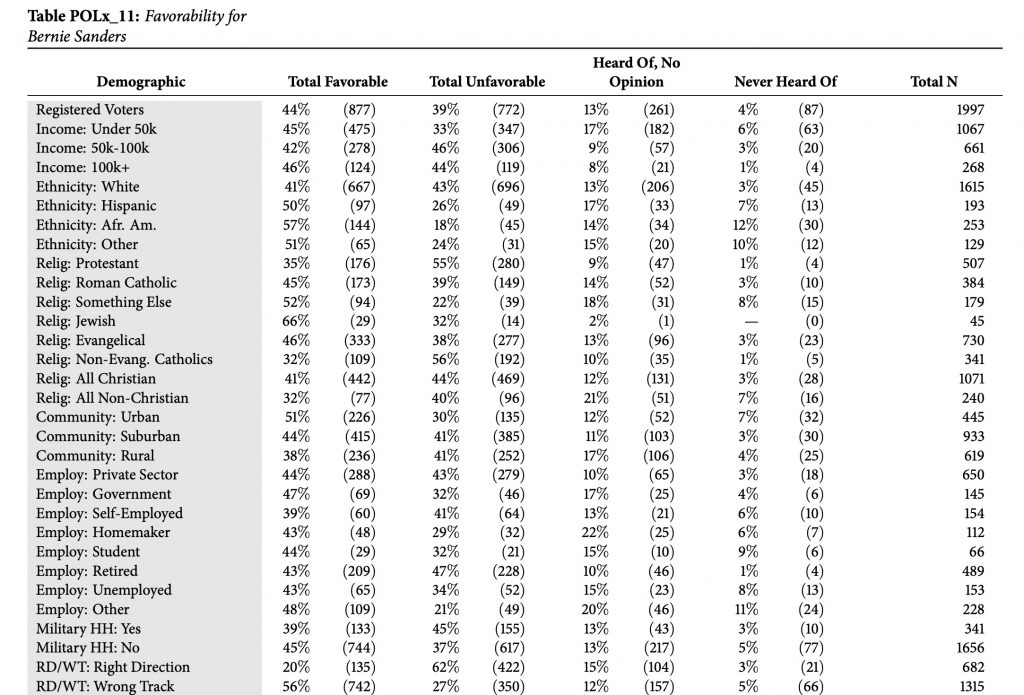
Bernie is doing very well with just about everyone who isn’t in his generation. Since that data came out, Bernie took the lead among all black voters.
Simply put, Bernie is the strongest candidate in the race by any measure you use, except for the moderate voter you’re afraid of but can’t show me.
Bernie was my candidate in the 16 primary. He was not automatically my pick this time around. I wanted to weigh my options and see how this election cycle was going to unfold. I fully expected that a lot of his support in 16 was because he was the only “not Hillary” candidate in the race. That concern was immediately knocked out when I saw how many unique donors he had to his campaign in the first month. And those numbers have only grown. He’s dominating with individual donors all across the country. Yes, even in those “moderate” states.
The other resistance I had to Bernie was that I really felt that he’s been incredibly effective at redefining what our core issues are as a candidate. Bernie and Bernie alone is the sole reason why Medicare For All is at the center of the conversation. Bernie is the reason why the whole country is talking about a $15 minimum wage. Obama was for a $9 minimum wage, while Hillary was aiming for $12 (while trying to take credit for $15). Occupy Wall Street gave us the term “the top 1%”, but Bernie is the one who pushed that message of grotesque inequality into out political debates in earnest.
I was concerned that Bernie wasn’t going to be as effective as president. Truth be told, I still am but he’s clearly the strongest candidate to beat Trump and that’s my immediate concern right now. I cannot let myself fall into a rabbit hole where I talk myself out of acknowledging the obvious fact before me: Bernie is by far the strongest candidate to beat Trump.
He has all of the excitement among every group under the age of 45. That’s where the motherland of mid and low propensity voters are, and that’s the logical tranche of new voters are. That’s where they were in the last midterm, and that’s where they’re most definitely going to be in this presidential election.
No one else in this race has built anything resembling a new kind of coalition. Biden was initially strong in the polls due to name recognition and because polls always target high propensity voters. They can’t ever see a new coalition coming so that’s something to keep in mind with polls. But when it came time to vote, he came in 4th, 5th and then finally 2nd. That is terrible for a former VP for a wildly popular president. He didn’t bring in anyone new.
By the way, even though the turnout wasn’t massively higher in the 1st three states than it was in 2016, the youth vote shot up by about 30% in each state.
Warren looked like she might be able to turn out some new voters, but her polls tanked in October when she released her fakakta M4A plan, and they’re not likely to come back up. Losing New Hampshire as badly as she did was really bad because NH and Massachusetts share the same media market. That whole “neighboring state” thing is bullshit, except in cases where two states share a media market. It’s not likely at this stage, that she’s going to be able to create a new coalition. She’s just lost too much of her support. Once voting has actually started, it’s very difficult to turn things around. That’s why Mayo Pete spent all of his money in the first three primaries. He thought that early state momentum would breed into more victories.
But Mayo Pete has virtually no support with millennials or with the black community so he’s a nonstarter. There is no possible coalition he can stitch together to win. He’s down to his last 25k to spend on Super Tuesday, which isn’t enough to do any kind of media buy in California. He spent all of his money on the first three states, and then Bloomberg came in and choked off the rich guy money flow to everyone in the race by telling his rich friends that he and he alone is going to fund the democratic presidential campaign. So Pete miscalculated on the wine cave game and he didn’t get any support from the places where democrats need support.
That leaves us with Bloomberg. He doesn’t have a ground game, large tranche of volunteers, or has even bothered to do any events. I literally don’t see how he’s going to turn out new voters. I certainly don’t see young people of color coming out in droves to vote if Bloomberg is the top of the ticket. I actually don’t see young people of any color turning out in big numbers. Remember, it’s all about the excitement and Bloomberg doesn’t seem to have any. This is a campaign that is only basing on high propensity voters showing up to vote, and I just don’t feel like gambling that there are enough of them to win is a good idea. He’s the candidate that high propensity voters are falling back on, now that Biden has imploded.
Now let me address the “moderate candidates combined have gotten more votes than Bernie” fallacy. Actually, it’s a fantasy because that’s not how elections work. The vast majority of voters don’t vote for an ideology or even a platform. They vote for a personality so assuming that if Amy, Pete, and Bloomberg get out of the way, Biden will win the nomination is absurd. Wanna know how I know? I’ve been paying attention to second choice polls for years and they’re psychotic. The strongest second choice candidate for Biden supporters is Bernie (to the tune of 33%). Only 24% have Bloomberg as their second choice. The second choice of Bloomberg supporters is Biden, who gets 28% of his supporters. That’s only 8 points more than Bernie gets. Mayo Pete supporters are pretty evenly split between Bloomberg, Klobuchar, and Sanders. Supporters of moderate candidates aren’t automatically going to go to the next moderate in line because that’s not the criteria they’re necessarily using to pick their candidates.
I didn’t settle on Bernie as my primary candidate until November. As I said, I was resistant to Bernie even though his platform aligns with my priorities most closely. I wasn’t sure he could win (which is my #1 priority), and I still have some concerns about his ability to affect policy. But at the end of the day, all of the data that I’ve been studying over the past few months makes it clear that Bernie is the strongest candidate against Trump. That’s the bottom line here.
I will address other concerns about Bernie in future posts. This one is about propensity voters so I don’t want to veer off course too much.

I truly appreciate your reliance on data and much of this article was well-reasoned and compelling. What I found disturbing was the very high negative numbers following Bernie around. Not middling, no opinion numbers, but unfavorable. Being a numbers guy myself, I cried out for a similar table of Warren numbers to compare.
Your assertion that “The vast majority of voters don’t vote for an ideology or even a platform. They vote for a personality ” is likely somewhat true. And it scares the bejeezus out of me. We will be trading one cult of personality for another. The downside of Bernie’s army of supporters is that he has weaponized them against fellow democrats. The not-so-hidden threat says that if I am not the candidate, you can kiss all these votes goodbye. This is not support for platform, policy or ideas, it is support for some guy that has come to be a figurehead.
I am distraught about this election, trying to find the best path to removing Trump from office in November. Right now, I see no clear path. Thanks for your careful analysis, but I am still seeking that path.